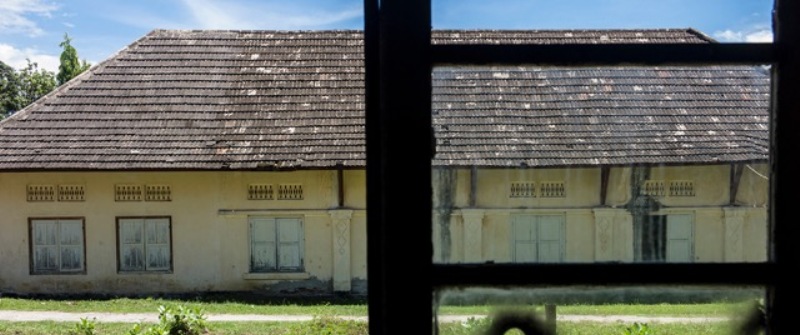
11 Jun Blog: Colonial pathologies and racial injustice
By David Kloos.
Twelve years ago, I was in the KITLV special collections room, studying archival materials about the colonial subjugation of Aceh, the region on the northern tip of Sumatra. It took four decades, from the 1870s to the 1910s, for the Dutch colonial army to crush large-scale resistance. After this, the struggle persisted but in other forms. Some Acehnese continued the ‘holy war’ on an individual basis. They attacked Europeans, in the hope of being killed in the act and die a martyr.
The Dutch could not really fathom these attacks because they had declared the war to be over. So, they pathologized them. The so-called Atjeh-moorden (‘Aceh murders’) were framed as symptoms of a racial condition: the result of a centuries-long degeneration of the Acehnese mind. In 1923, the largest mental asylum of the Netherlands Indies was built in Aceh in response to the attacks and on the basis of advice provided by ethnologists and psychiatrists. Thousands of people were incarcerated and ‘treated’ there involuntarily.
The buildings are still there. You can visit them.
The terminology is important. The attacks, psychiatrists said, were a special, local form of amok. Malays occasionally ran amok, destroying things and hurting people for no apparent reason. The Acehnese attacks were similar except for being infused with religious fanaticism. This was the argument.
Matthias van Rossum has shown that, in the eighteenth century, before the establishment of the modern colonial state and the scientific disciplines that supported it, amok was used as a battle cry, a way of mobilizing collective, organized, and highly rational resistance. It was not until the nineteenth and twentieth century that the term became an obsession for colonial governments and psychiatrists.
I wrote the first version of my paper on the Atjeh-moorden in the summer of 2011. And it was as if my research – on armed resistance motivating racialized discourse, and racialized discourse motivating state violence – was suddenly reenacted in a contemporary setting.
Across the Channel, the UK was set ablaze. What settled in public memory as the ‘2011 London riots’ was an outcome of a gamut of frustrations. Grotesque inequalities, unequal opportunities, racism, and anger about the deadly shooting of a young black man, Mark Duggan, for reasons never explained, by a police officer ‘known only as V53’. It was about injustice.
Prime Minister David Cameron told parliament that the ‘rioters’ were criminals ‘pure and simple’ and declared that the police would get ‘whatever resources’ they needed. In the tabloids, meanwhile, criminality morphed into insanity. The mobsters had lost it. They were ‘gangs running amok’. Newspapers went for headlines featuring mobs, anarchy, and war zones. The Daily Express chose ‘Flaming Morons’. Metro said: ‘Riots: The Madness Spreads’.
Much ink has been spent on the rise of populism, but this, frankly, was just like a needle stuck in a record player. During the ‘race riots’ in London in 1958, black men defending themselves against white fascists were represented in British media as savages ‘running amok in the streets’.
The rhetoric, in other words, is readily available. It needs little dusting and it resonates widely. Isn’t it extraordinary that, when Trump tweeted ‘when the looting starts the shooting starts’, apparently many people knew immediately what he was referring to? I mean his supporters, not historians or journalists. That quotation goes back more than 50 years. This seemingly effortless reproduction of discourse and its reverberation is the story here, if you ask me.
Trump uses the Nixon playbook, crying law and order to defy ‘looters’ and ‘left-wing terrorists’. In the Netherlands, Geert Wilders follows suit when he tries to frame the protests in Europe as a bacchanal of ‘looting, violence, and intimidation’. Time to stop this madness, is what he implies.
The strategy of pathologizing resistance against racial and other injustices is common, broadly accepted, and rooted in colonialism. What does it mean for me to work and think about these things at KITLV, an epitome of colonial collecting and scholarship?
It means awkwardness, for one. The very first document I requested in the KITLV reading room in 2008 was written by the Dutch orientalist Christiaan Snouck Hurgronje. This report, which spelled out social fissures within Acehnese society, constituted the impetus for a brutal divide and conquer strategy. It directly contributed to a richly documented yet unimaginable suffering. It was Snouck Hurgronje who advanced the theory of the Acehnese degenerated mind. He later became a professor in Leiden and chair of the Learned Society KITLV.
Leiden, where I was born and raised and where I now live again, has both an ‘Aceh-street’ and a ‘Snouck Hurgronje-street’. Inexplicably, Leiden University recently created the ‘Snouck Hurgronje Prize’, awarded to ‘student activities or initiatives (…) that promote cohesion’.
It means being part of a community of scholars from around the world who care deeply about Indonesian and Caribbean societies, past and present.
It means a resolve to bring more politics and activism into an institution that has a long history of not taking position out of fear for not being seen as objective, risking contacts and projects, and undoubtedly for ideological reasons too.
It means a desire to identify reverberations of colonial prejudice and racism across geographic and temporal divides – even if causal connections or direct comparisons do not always hold – by scrutinizing concepts, images, references, and implications, however intended.
Image: The mental asylum in Sabang (Aceh, Indonesia), closed in 1942 – Nicole Segers.
(David Kloos is a senior researcher and a member of the KITLV Management Team (Portfolio Research). His work is characterized by a combination of historical and anthropological research methods. He is interested in religion, gender, violence, colonialism, knowledge formation, visual methods, and the social and political aspects of climate change.)




No Comments